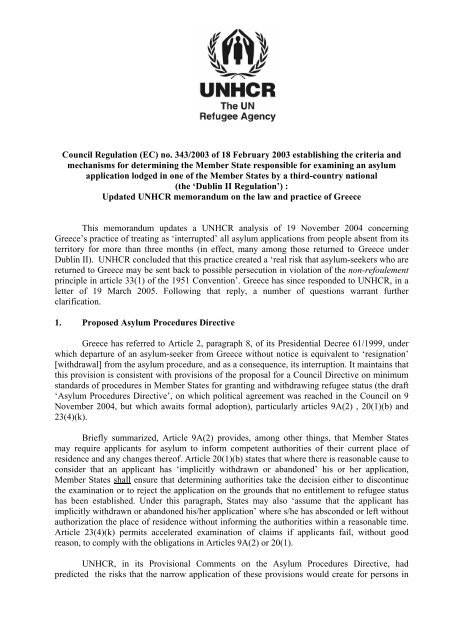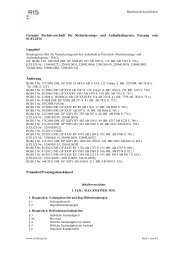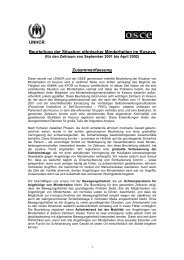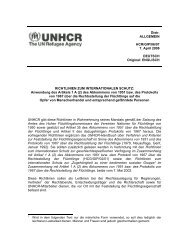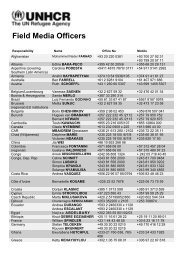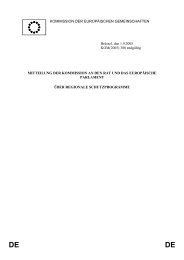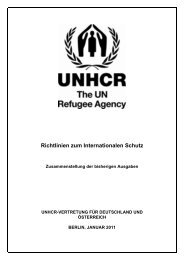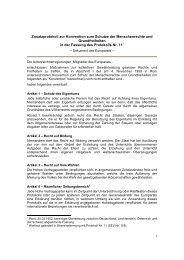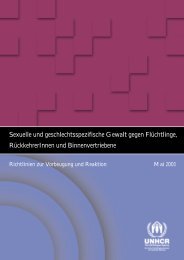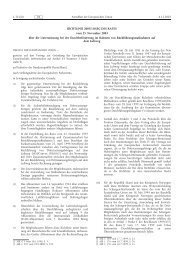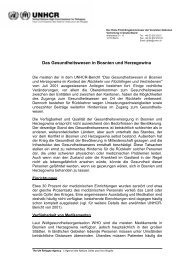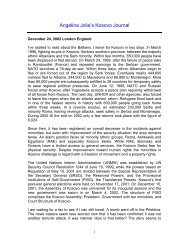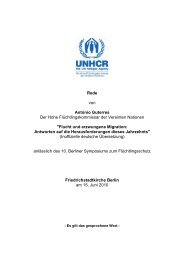Council Regulation (EC) no - UNHCR
Council Regulation (EC) no - UNHCR
Council Regulation (EC) no - UNHCR
You also want an ePaper? Increase the reach of your titles
YUMPU automatically turns print PDFs into web optimized ePapers that Google loves.
<strong>Council</strong> <strong>Regulation</strong> (<strong>EC</strong>) <strong>no</strong>. 343/2003 of 18 February 2003 establishing the criteria and<br />
mechanisms for determining the Member State responsible for examining an asylum<br />
application lodged in one of the Member States by a third-country national<br />
(the ‘Dublin II <strong>Regulation</strong>’) :<br />
Updated <strong>UNHCR</strong> memorandum on the law and practice of Greece<br />
This memorandum updates a <strong>UNHCR</strong> analysis of 19 November 2004 concerning<br />
Greece’s practice of treating as ‘interrupted’ all asylum applications from people absent from its<br />
territory for more than three months (in effect, many among those returned to Greece under<br />
Dublin II). <strong>UNHCR</strong> concluded that this practice created a ‘real risk that asylum-seekers who are<br />
returned to Greece may be sent back to possible persecution in violation of the <strong>no</strong>n-refoulement<br />
principle in article 33(1) of the 1951 Convention’. Greece has since responded to <strong>UNHCR</strong>, in a<br />
letter of 19 March 2005. Following that reply, a number of questions warrant further<br />
clarification.<br />
1. Proposed Asylum Procedures Directive<br />
Greece has referred to Article 2, paragraph 8, of its Presidential Decree 61/1999, under<br />
which departure of an asylum-seeker from Greece without <strong>no</strong>tice is equivalent to ‘resignation’<br />
[withdrawal] from the asylum procedure, and as a consequence, its interruption. It maintains that<br />
this provision is consistent with provisions of the proposal for a <strong>Council</strong> Directive on minimum<br />
standards of procedures in Member States for granting and withdrawing refugee status (the draft<br />
‘Asylum Procedures Directive’, on which political agreement was reached in the <strong>Council</strong> on 9<br />
November 2004, but which awaits formal adoption), particularly articles 9A(2) , 20(1)(b) and<br />
23(4)(k).<br />
Briefly summarized, Article 9A(2) provides, among other things, that Member States<br />
may require applicants for asylum to inform competent authorities of their current place of<br />
residence and any changes thereof. Article 20(1)(b) states that where there is reasonable cause to<br />
consider that an applicant has ‘implicitly withdrawn or abandoned’ his or her application,<br />
Member States shall ensure that determining authorities take the decision either to discontinue<br />
the examination or to reject the application on the grounds that <strong>no</strong> entitlement to refugee status<br />
has been established. Under this paragraph, States may also ‘assume that the applicant has<br />
implicitly withdrawn or abandoned his/her application’ where s/he has absconded or left without<br />
authorization the place of residence without informing the authorities within a reasonable time.<br />
Article 23(4)(k) permits accelerated examination of claims if applicants fail, without good<br />
reason, to comply with the obligations in Articles 9A(2) or 20(1).<br />
<strong>UNHCR</strong>, in its Provisional Comments on the Asylum Procedures Directive, had<br />
predicted the risks that the narrow application of these provisions would create for persons in
need of international protection. The Office had expressed its concerns, in particular on Article<br />
20(1), as follows:<br />
“In <strong>UNHCR</strong>’s view, a claim may be explicitly or implicitly withdrawn for a variety of reasons<br />
which are <strong>no</strong>t necessarily related to a lack of protection needs. A time limitation on the<br />
reopening of a claim, or a rejection of a claim in such circumstances, carries the risk that<br />
existing protection needs are <strong>no</strong>t examined and recognized.<br />
Both time limitations and rejections are particularly problematic in cases where applicants are<br />
sent to a<strong>no</strong>ther country, for example, under the Dublin II <strong>Regulation</strong>, or where the ‘safe third<br />
country’ concept has been applied. Often, the asylum-seeker is <strong>no</strong>t aware of the details and<br />
consequences of such arrangements. If an asylum-seeker is sent back to a<strong>no</strong>ther Member State<br />
where he or she had already submitted an application, the deadline for reopening a claim will<br />
generally have passed, or the asylum application will meanwhile have been rejected, and the<br />
applicant will have missed all deadlines for filing an appeal.<br />
Moreover, the reopening of a claim is often cumbersome and practically very difficult in some<br />
countries, for example where rejected asylum-seekers are subject to immediate deportation.<br />
Where a claim has been rejected, the submission of a subsequent application may be possible,<br />
but is often subject to similar obstacles and may only result in an examination of cases where<br />
new facts have arisen since the rejection of the first application”.<br />
<strong>UNHCR</strong> therefore recommends that a withdrawal should result in a discontinuation of<br />
the procedure only and the closing of the file. A reopening of the application should be possible<br />
without time limits.<br />
These concerns are <strong>no</strong>t addressed in the Greek practice or provisions. As explained in<br />
<strong>UNHCR</strong>’s <strong>no</strong>te attached to its letter of 24 November 2004, applications which are treated as<br />
interrupted upon return to Greece under Dublin II may <strong>no</strong>t necessarily receive any substantive<br />
consideration before the claimant is removed from the country. Consequently, there is a danger<br />
that such claimants may be removed in direct or indirect violation of the principle of <strong>no</strong>nrefoulement.<br />
2. Stay of deportation<br />
Greece has maintained that <strong>no</strong>n-refoulement is respected in practice through the asylum<br />
procedure and the possibility of a stay of enforcement of removal orders. In its letter, the Greek<br />
Ministry states that deportation can be stayed by the General Secretary of the Region, upon<br />
appeal or by his own motion, where there are ‘humanitarian reasons concerning the life or health<br />
of the third country national’. This possibility is <strong>no</strong>t, in <strong>UNHCR</strong>’s view, sufficient to safeguard<br />
against the risk of persecution. The limited scope of this power to stay deportation on<br />
‘humanitarian’ grounds appears to be restricted to cases where immediate practical obstacles to<br />
return emerge, such as illness. The process of considering stay requests does <strong>no</strong>t allow for a<br />
comprehensive analysis of the risk of persecution or exposure to torture, inhuman or degrading<br />
treatment on return, which are questions more appropriately considered as part of a substantive<br />
asylum claim examination. Furthermore, even if the deportation is <strong>no</strong>t carried out, the person<br />
concerned is <strong>no</strong>t admitted into the asylum procedure and remains in Greece under unclear legal<br />
circumstances.<br />
2
3. Dublin II: Right of other States to examine claims under article 3(2), and definition<br />
of ‘examination’ of a claim<br />
The Ministry has also pointed out that on receipt of Dublin II requests, Greece<br />
systematically informs the requesting State authority that the process will be considered<br />
‘interrupted’ in Greece. This provides the requesting State with the opportunity to decide to<br />
examine the claim itself, under Article 3(2) of the Dublin II <strong>Regulation</strong>.<br />
The implication of this argument is that it is the responsibility of other participating<br />
States, and <strong>no</strong>t of Greece, to ensure that claims receive substantive examination - if those States<br />
consider it appropriate to exercise their discretion under Article 3(2). However, the Dublin II<br />
<strong>Regulation</strong> does <strong>no</strong>t appear to permit States unilaterally to divest themselves of their obligations<br />
to provide international protection to those entitled to it, with <strong>no</strong> clear legal guarantee that the<br />
applicant can receive it in a<strong>no</strong>ther State.<br />
The Preamble of the <strong>Regulation</strong> suggests that such narrow interpretations of participating<br />
States’ obligations are <strong>no</strong>t consistent with the <strong>Regulation</strong>’s aim. In paragraph 4, the Preamble<br />
provides that the <strong>Regulation</strong> should ‘make it possible to determine rapidly the State responsible,<br />
so as to guarantee effective access to the procedures for determining refugee status…’<br />
(underlining added), and reiterates that States are bound by obligations under instruments of<br />
international law to which they are party (paragraph 12). The <strong>Regulation</strong> also enshrines the<br />
objective to ‘ensure full observance of the right to asylum guaranteed by article 18’ of the<br />
Charter of Fundamental Rights (paragraph 15, Preamble).<br />
These objectives can<strong>no</strong>t effectively be met if participating States are entitled to decline<br />
any substantive examination of a claim, on grounds unrelated to the applicant’s potential need<br />
for international protection. Absence from the territory, or failure to stay at a particular place of<br />
residence or to <strong>no</strong>tify a change of residence, are formal aspects of the applicant’s circumstances<br />
which do <strong>no</strong>t affect or diminish the potential risk of persecution or serious harm which she or he<br />
might face.<br />
The <strong>Regulation</strong> is moreover intended as a means of determining the State which is<br />
responsible for examining an asylum application (<strong>Regulation</strong>, Article 3). If the Greek<br />
interpretation is correct, it would in theory be open for all participating States to adopt similar<br />
national laws, which would in turn divest them of responsibility for examining an asylum claim<br />
in substance, after it had been ‘interrupted’ in a Dublin II procedure. This would <strong>no</strong>t serve the<br />
aim of determining the State responsible, but would consign thousands of asylum claims to<br />
uncertainty. It would add greatly to the negative human impact of the system, as asylum-seekers<br />
would face the prospect of waiting in limbo as disagreement about their futures continued, their<br />
claims left undetermined. Moreover, they would face the threat of expulsion to countries where<br />
their safety might <strong>no</strong>t be guaranteed. It is thus regretted that <strong>UNHCR</strong>’s comments on Article<br />
20(1) of the Asylum Procedures Directive have <strong>no</strong>t been taken into account to date by the Greek<br />
authorities.<br />
These points highlight the need for authoritative clarification and guidance on both the<br />
Dublin II system and the Asylum Procedures Directive, particularly where provisions of the two<br />
interact.<br />
The Ministry additionally refers to the wide definition of ‘examination’ in Article 2(e) of<br />
the <strong>Regulation</strong>. <strong>UNHCR</strong> does <strong>no</strong>t believe, however, that the decision to interrupt the asylum<br />
procedure satisfies the requirement to ‘examine’ an asylum application under the Dublin II<br />
3
<strong>Regulation</strong>. <strong>UNHCR</strong> continues to believe that a decision to interrupt an asylum procedure on<br />
formal grounds does <strong>no</strong>t safeguard asylum-seekers from refoulement and can<strong>no</strong>t be interpreted<br />
as an ‘examination’ of the content of a claim.<br />
4. Objectives of the Dublin II <strong>Regulation</strong> and Amsterdam Treaty<br />
If the Ministry’s interpretation of the Dublin II provisions were correct and were a<br />
similar approach to be adopted by other States, the purpose and successful operation of the<br />
Dublin II <strong>Regulation</strong> – and the goal of identifying the State responsible for determining an<br />
asylum claim – would appear to be defeated. However, basic principles of legislative<br />
interpretation would dictate that an interpretation which would deprive an instrument of<br />
meaning and defeat its objectives can<strong>no</strong>t be maintained.<br />
The Amsterdam Treaty provides that Community measures on asylum shall be in line<br />
with the 1951 Convention relating to the Status of Refugees. This means that an interpretation of<br />
the Dublin II <strong>Regulation</strong> and the Asylum Procedures Directive which creates the risk of<br />
refoulement contrary to Article 33(1) would raise serious legal concerns, <strong>no</strong>t only as a matter of<br />
Community law, but also under international law.<br />
<strong>UNHCR</strong> therefore urges the Commission to pursue this matter expeditiously with<br />
Greece, with a view to ensuring that claimants returned under the Dublin II <strong>Regulation</strong> are<br />
assured of a substantive application of their claims, both in practice and under the law. Given its<br />
regular contacts with the relevant Ministry, <strong>UNHCR</strong> would be pleased to provide constructive<br />
input to or take part in any discussions with the Greek authorities which may be appropriate.<br />
In addition, <strong>UNHCR</strong> would be interested in the Commission’s authoritative<br />
interpretation of the provisions of the Dublin II <strong>Regulation</strong> and the draft Asylum Procedures<br />
Directive which are cited by Greece in support of its position. It would appear that other<br />
participating governments would also be very interested in the Commission’s guidance in this<br />
respect, especially as concerns Article 20 (1) of the Asylum Procedures Directive and any<br />
formal legal steps planned by the Commission.<br />
Finally, <strong>UNHCR</strong> <strong>no</strong>tes that Greece, like a number of other Member States at the Union’s<br />
external borders, receives a significant number of asylum applicants under the Dublin II<br />
<strong>Regulation</strong>. This is borne out by the statistics gathered as part of the monitoring process for<br />
Dublin II. Measures to encourage greater responsibility-sharing among Member States may<br />
assist in reducing the pressures on Greece and other States in similar positions, including the<br />
impact of returns of asylum-seekers under the Dublin II <strong>Regulation</strong>.<br />
<strong>UNHCR</strong>, 30 November 2005<br />
4


